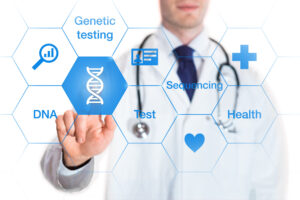There are many exciting discoveries and misconceptions in the field of genetic health. As genetic research advances, it reveals important facts about our health, but some myths persist. These myths can lead to misconceptions about the role of genes in health and disease. Let’s debunk some of the most common myths about genetic health.
Genetic health is a field surrounded by both fascinating discoveries and misconceptions. As genetic research has advanced, it has unveiled crucial insights into our health, but several myths persist. These myths can lead to misunderstandings about the role of genetics in health and disease. Let’s debunk some of the most common myths about genetic health.
Myth 1: Genetic Health Deterministically Dictates Your Future
Many people believe in the misconception that your genes definitively determine your health. It is believed that if you inherit a gene that is linked to a disease, you will develop that disease. This idea is called genetic determinism. However, genes are only one piece of the puzzle. Some genetic changes can cause a person to develop certain diseases, but that does not mean that he or she will develop those diseases. Health outcomes are also affected by environmental factors, lifestyle choices, and the way your genes interact. For example, if you have a genetic risk for heart disease, you can reduce your risk by living a healthy lifestyle with a balanced diet and regular exercise.
Myth 2: Genetic Testing Can Predict Every Health Issue
Another common misconception is that genetic testing can tell you about every health problem that may occur. Some genetic tests can tell you a lot about your risk for certain genetic diseases and conditions, but they are not perfect. Genetic testing can better identify people at risk for certain diseases that are known to be linked to genes, such as Huntington’s disease or cystic fibrosis. They are not good at predicting most diseases, such as cancer and heart disease, which are complex and influenced by many genetic and environmental factors. In addition, genetic testing does not always reveal all the health problems that can occur as a result of lifestyle choices, environmental exposures, or the interaction of different genes.
Myth 3: Genetic Information Will Reveal Your Future Health Problems
Some people believe that genetic testing can accurately tell them what health problems they will develop in the future. Genetic testing can tell you whether you are more likely to develop certain diseases, but it cannot determine your future health. Genetics and health are linked in complex ways, as many genes and environmental factors interact. For example, a genetic test may show that you are more likely to develop a certain type of cancer, but this does not mean that you will get that cancer. Lifestyle, exposure to carcinogens, and overall health are some of the other factors that influence the development of the disease.
Myth 4: Only Rare Genetic Diseases Are Inherited
Many people believe that rare genetic diseases are the only ones that can be inherited. Genes can play a role in both rare and common conditions. Mendelian inheritance clearly shows how rare genetic diseases such as Tay-Sachs disease or Duchenne muscular dystrophy are inherited. More common diseases such as diabetes, heart disease, and even some cancers are linked to genes. These common diseases are often caused by multiple genes, each of which slightly increases the overall risk. Environmental and lifestyle factors can also play a role. This is why genetics can affect many different health conditions, not just rare ones.
Myth 5: Genetic Testing Is Only for Individuals with a Family History of Disease
A common misconception is that genetic testing is only useful for people who have a family history of the disease. A history of a genetic condition in your family can make genetic testing more important, but it is not the only reason to consider genetic testing. Genetic testing can be useful for people who do not appear to have a family history of inherited conditions. For example, some genetic diseases can be caused by new mutations rather than inherited mutations. In addition, even if there is no history of certain diseases in the family, genetic testing can identify potential health risks and help prevent them.
Myth 6: Genes Are the Sole Determinants of Health
People often think that genes are the only determinant of health, but that is not the case. While genes are important to health, they do not play a role on their own. Genes and environmental factors, such as diet, exercise, and exposure to toxins, work together to influence overall health. For example, a person whose genes increase their likelihood of being overweight may not be overweight if they eat well and stay active. Likewise, environmental factors can change the way genes are expressed, demonstrating how genes and lifestyle affect health outcomes.
Conclusion
It is important to understand the truth about genetic health and to dispel common misconceptions so that you can make informed choices about genetic testing and how it affects your health. Genetics are an important part of health, but they are only part of a larger picture that includes lifestyle and environment. By dispelling the myths and understanding the truth about genetic health, people can better manage their health and make decisions based on sound science.
FAQs
1. What is Genetic Determinism and How Does It Work in Healthcare?
Genetic determinism means that a person’s genes determine their health, while their environment and lifestyle have no influence. Genes have a major influence on health, but they interact with lifestyle choices, environment, and other factors. For example, just because someone has a gene that makes them more likely to get a disease does not mean they will get it. Lifestyle and environmental factors also play a major role.
2. Can genetic testing tell you about all possible health problems?
No, genetic testing cannot tell you about all possible health problems. Genetic testing can identify factors that put you at risk for certain diseases and conditions, but it cannot find everything. Most genetic tests are only useful in cases where a genetic link is clear, but many complex diseases are caused by a combination of genetic and environmental factors. Genetic testing can give you a lot of useful information, but it cannot always tell you about different health problems.
3. Can genetic testing tell me accurately what health problems I will have in the future?
Genetic testing can help you understand how likely you are to develop certain health problems, but it cannot determine which problems you will have in the future. Genetic testing does not always give 100% accurate predictions, but it can show trends or a higher risk for certain conditions. Health outcomes are influenced by a combination of genetics, lifestyle choices, and environmental exposures.
4. Are rare genetic diseases only inherited?
No, genetic differences can cause common and rare diseases. There are clear patterns in how rare genetic diseases such as cystic fibrosis are inherited, but common diseases such as diabetes and heart disease also have a genetic component. Often, these common conditions are caused by multiple genes interacting with environmental factors. This suggests that genetic factors influence more than just rare diseases.
5. Is genetic testing only useful for people with a family history of the disease?
Genetic testing can help everyone, regardless of their family history. Testing may be more important if there is a genetic history in the family. However, many genetic diseases are caused by new mutations or the complex interactions of many genes. Genetic testing can provide people with information and ways to prevent developing certain diseases, even if they appear to have no family history of them.




